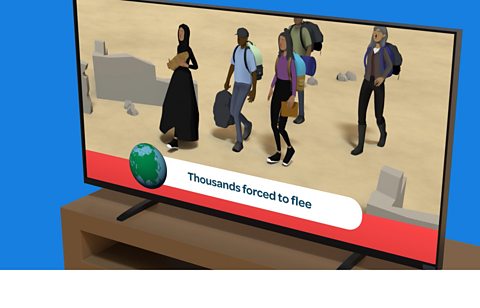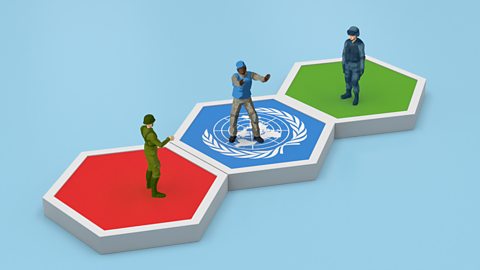Conflict over resources
Conflict is not new and different kinds of conflicts have happened over the centuries. These include the Norman Conquest and the Battle of Hastings in 1066 and more recent conflicts like the Second World War (1939-1945) or the Cold War (1947-1991).
Conflicts may be the result of disputes about land use or resources, over political authority or territorial rights. Religion and ideals can also affect how different countries interact with each other and can lead to conflicts.
Watch: Geographical conflicts video
Watch this short clip to learn more about conflicts over resources.
Every conflict in human history has been caused by its own completely unique set of circumstances.
They can be triggered by anything from religious differences, to economic gain, to cultural revolutions.
And then thereтs the control of resources. These could be physical - water, oil, gold or ideological: resources that donтt exist in the physical world, but are just as important. Belief. Loyalty. The respect of the people.
Conflicts over resources can break out anywhere. Including Wales.
In 1957, the British government decided that Capel Celyn in Gwynedd т one of the last entirely Welsh-speaking communities in existence т would be flooded to create a reservoir in order to provide water for Liverpool and the surrounding area.
Despite mass protests, direct action, and conflict between protesters and the authorities, the village т and the Tryweryn valley surrounding it т was flooded in 1965.
Not a drop of blood was spilled during the Tryweryn crisis. But we can still define it as a тconflictт т one which, to an extent, continues to be fought today.
In 1982, Argentina invaded the Falkland Islands, also known as the Malvinas, about 260 nautical miles from the coast of South America. The United Kingdom claimed sovereignty over the islands but the Argentinians wanted them. Badly.
The conflict lasted for three months, with Argentina finally surrendering on 14 June. During that time, over 900 people died. Apart from the material wealth of the Falkland Islands, they were important for ideological reasons. Argentina simply believed that the islands belonged to them.
During the Falklands War - as in so many other conflicts throughout history - propaganda campaigns were in full use on both sides. Propaganda campaigns aim to convince people that the actions of a government - including the decision to go to war - are somehow justified. Propaganda is as old as conflict itself, and the idea of a тjust warт is common to many religions, including Catholicism. Of all the reasons used to justify conflict, there is one which comes into play more often than not. Money.
Every year, over 3 trillion US dollars of trade passes through the South China Sea: an area of ocean between China, Vietnam, Malaysia, Indonesia and the Philippines. These countries control territory up to 200 nautical miles from the coast. But in international waters, this huge amount of wealth isnтt really controlled by anyone.
But since 2013, China has been expanding their territory: claiming ownership of the South China Sea, by taking islands and building on them. Pushing their territory further and further into the ocean. Which means that those international watersтІ arenтt so international any more.
As conflicts go, itтs an unusual one. But as countries around the world ramp up their nuclear weapons, and traditional warfare becomes less and less likely, we may have to redefine what the word тconflictт means as weтve already done so many times in the past.
Conflict in Wales
In 1957, a private bill sponsored by Liverpool City Council was brought before Parliament to create a reservoir in the Tryweryn valley, near Bala, Gwynedd. This was to meet the increasing need for water for households and industry in Liverpool and the Wirral. It meant that the village of Capel Celyn would be flooded.
Liverpool City Council were able to obtain authority through an Act of Parliament. This meant that the development could bypass any planning inquiry in Wales where any arguments against the proposal could be made.
The flooding of the Tryweryn Valley sparked conflict between Welsh people and the UK Government. Several peaceful protests were held and hundreds of people including the residents of Capel Celyn marched through the streets of Liverpool.
On 10 February 1963 the militant group Mudiad Amddiffyn Cymru planted a bomb that damaged an electrical installation on the dam construction site in an attempt to stop the flooding of the valley.
Welsh local authorities opposed the flooding and 27 of the 36 Welsh MPs voted against the second reading of the bill with none of them supporting it. Despite this the valley was flooded in 1965.
The village and its buildings, including the post office, school, and chapel were lost, with farms being submerged. This led to the primarily Welsh speaking locals being displaced or losing their livelihoods.
Impact of conflict
Conflict causes a number of different problems and these are normally felt the hardest in developing countries.
Conflict can spark a variety of other issues such as:
- terrorism - groups attempt to influence governments through acts of violence
- civil war - opposing groups use armed violence in order to gain control of a country
- war - when armed violence is used by one country against another for power and control
These issues can cause widespread suffering because people are caught up in the conflict and are in danger of being harmed by armed groups. Others are forced to migrate to other countries, often as refugees and asylum seekers to find safety and security.
Conflict can also have a damaging impact on a country's ability to develop when leaders spend money on weapons instead of new infrastructure, education and healthcare for its people. War and terrorism can often lead to poor sanitation and hygiene, the spread of diseases and starvation.
Resolving conflict
Turning a period of conflict into non-conflict is known as conflict resolution. This can be achieved by a number of means, including:
- compromise - both conflicting groups come to an agreement which will often involve both sides giving way in some respects
- democratic debate - organisations give opposing groups the chance to debate their views on current situations and plans moving forward, take a vote, and abide by the majority decision. As long as everyone agrees and sticks to the overall decision, conflict can be avoided.
Many organisations help to reduce the effects of conflicts by providing resources, healthcare and education. The United Nations is also focused on peacebuilding efforts across the world by strengthening national capacities for conflict management.
The UN has been at the centre of international peacekeeping efforts in countries such as Cambodia, Afghanistan, Haiti and Sudan. It aims to ensure peace by providing international support and interventions such as:
- the monitoring of ceasefires
- assisting the return of refugees and displaced persons
- helping to organise and monitor elections of new governments
More on Conflict and peace
Find out more by working through a topic
- count3 of 3

- count1 of 3
